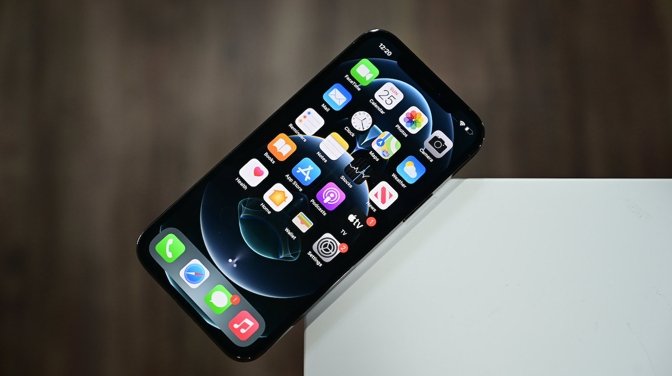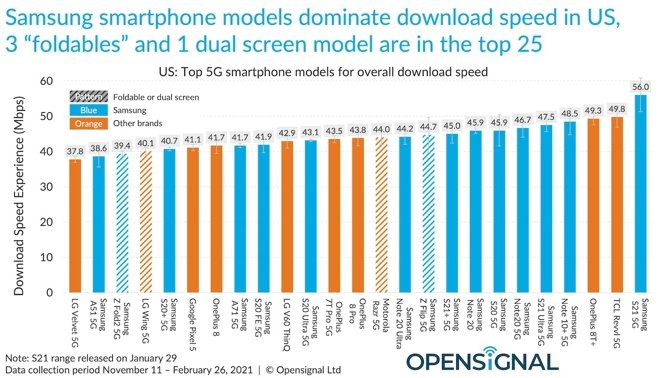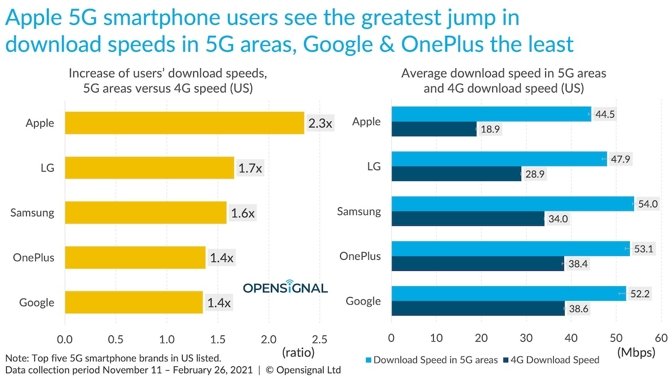iPhone 12 5G speeds lag behind Android rivals, report says
A new report suggests that 5G performance on the iPhone 12 and iPhone 12 Pro lineups lag many of their Android-based competitors.

Credit: Andrew O'Hara, AppleInsider
Although the iPhone 12 and iPhone 12 Pro models saw a 2.3 times increase in speeds compared to their 4G iPhone counterparts, Apple's latest smartphones ranked lower than at least 25 Android models in the OpenSignal speed report.

Credit: OpenSignal
Samsung accounted for at least 60% of the top 25 fastest smartphones in the report, which ranked devices based on average 5G or 4G download speeds. Apple devices didn't break the top 25, OpenSignal says.
The Samsung Galaxy S21 5G took the top spot with an average speed of 56 Mbps. Next up were the TCL Revvl 5G and the OnePlus 8T+, with speeds of 49.8 Mbps and 49.3 Mbps, respectively. In 25th place was the LG Velvet 5G with 37.9 Mbps.

Credit: OpenSignal
The iPhone 12 Pro and iPhone 12 Pro Max clocked in slower with speeds of 36.9 Mbps and 36.2 Mbps, OpenSignal claims. The iPhone 12 and iPhone 12 mini had speeds of 29.6 Mbps and 32.9 Mbps, respectively.
OpenSignal does add that Apple devices did see a bigger jump in speeds with the 5G upgrade, though it attributes that to the fact that previous devices were using slower Intel modems rather than Qualcomm units.
The company also tracked a 36% speed increase when comparing current 5G-equipped iPhone 12 models with cellular iPad Pro devices. That, OpenSignal adds, suggests that future iPad Pro users could see a significant speed bump when 5G-equipped models debut.
As for why Apple's 2021 devices are lagging behind in terms of download speeds, OpenSignal's Ian Fogg told 9to5Mac that it may have to do with RF design. The iPhone 12 is Apple's first 5G device, while Samsung is currently on its third generation of 5G-equipped handsets.
Stay on top of all Apple news right from your HomePod. Say, "Hey, Siri, play AppleInsider," and you'll get latest AppleInsider Podcast. Or ask your HomePod mini for "AppleInsider Daily" instead and you'll hear a fast update direct from our news team. And, if you're interested in Apple-centric home automation, say "Hey, Siri, play HomeKit Insider," and you'll be listening to our newest specialized podcast in moments.

Credit: Andrew O'Hara, AppleInsider
Although the iPhone 12 and iPhone 12 Pro models saw a 2.3 times increase in speeds compared to their 4G iPhone counterparts, Apple's latest smartphones ranked lower than at least 25 Android models in the OpenSignal speed report.

Credit: OpenSignal
Samsung accounted for at least 60% of the top 25 fastest smartphones in the report, which ranked devices based on average 5G or 4G download speeds. Apple devices didn't break the top 25, OpenSignal says.
The Samsung Galaxy S21 5G took the top spot with an average speed of 56 Mbps. Next up were the TCL Revvl 5G and the OnePlus 8T+, with speeds of 49.8 Mbps and 49.3 Mbps, respectively. In 25th place was the LG Velvet 5G with 37.9 Mbps.

Credit: OpenSignal
The iPhone 12 Pro and iPhone 12 Pro Max clocked in slower with speeds of 36.9 Mbps and 36.2 Mbps, OpenSignal claims. The iPhone 12 and iPhone 12 mini had speeds of 29.6 Mbps and 32.9 Mbps, respectively.
OpenSignal does add that Apple devices did see a bigger jump in speeds with the 5G upgrade, though it attributes that to the fact that previous devices were using slower Intel modems rather than Qualcomm units.
The company also tracked a 36% speed increase when comparing current 5G-equipped iPhone 12 models with cellular iPad Pro devices. That, OpenSignal adds, suggests that future iPad Pro users could see a significant speed bump when 5G-equipped models debut.
As for why Apple's 2021 devices are lagging behind in terms of download speeds, OpenSignal's Ian Fogg told 9to5Mac that it may have to do with RF design. The iPhone 12 is Apple's first 5G device, while Samsung is currently on its third generation of 5G-equipped handsets.
Stay on top of all Apple news right from your HomePod. Say, "Hey, Siri, play AppleInsider," and you'll get latest AppleInsider Podcast. Or ask your HomePod mini for "AppleInsider Daily" instead and you'll hear a fast update direct from our news team. And, if you're interested in Apple-centric home automation, say "Hey, Siri, play HomeKit Insider," and you'll be listening to our newest specialized podcast in moments.

Comments
"Opensignal report claims iPhone 12 is slower than almost every Android phone in 5G/4G speed tests"
This is a little disheartening if you bought the iPhone 12 in any configuration. I wonder how far along in the iPhone 12 development cycle that Apple's and Qualcomm's engineers knew they weren't going to achieve anything close to the potential of the modem from Qualcomm? Can some of this be resolved with firmware or software updates or is this all hardware design (RF) shortcomings? Apple's engineers are some of the best and brightest and RF is nothing new to them. Are the modems themselves that are sourced from Qualcomm basically the same (5G) in iPhone 12 models as those in other phone manufacturers who had better results?
The problem with this bullshit report is that it is based on tests done by users on their free app. There was no standardized testing conducted (for example, by using all the devices cited in the same area at the same time). The sample data is made up only of people who selected themselves and performed the tests at different times on different days and at different locations.
I would not question the reports, but I agree that the outcome is simply irrelevant in day-to-day usage for us end users, in particular when considering that these are only average numbers: as Fastasleep mentioned you could also have almost 250 Mb/s on iPhones.
First, true comparisons are very difficult; you need to have two devices with all other conditions identical.
Second, I wouldn't be surprised if Apple is a bit behind - the iPhone 12 is the first phone that included a 5G chip and it's the slightly older x55 model. Samsung likely does benefit from better integration. (The counter argument here is that as an end user, one all that matters is the actual performance, not the reasons it may be better or worse.)
Most importantly, however is the fact that differences between modems and phones are going to be minor compared to the differences in signal strength and reception due to geography, topography, etc. As I've said many times before, good 4G signal is more than enough for the vast majority of people and uses, so getting 400 Gb speeds on a specific street corner matters far less to me than the actual wireless coverage as @ashoklalbharwani demonstrated in his post.
@flydog is right. Their testing procedure is suspect and even if their results were 100% accurate, they'd mostly be irrelevant. The real world difference in speed is negligible and likely undetectable by most people.
My 2016 Ford F-150 has a six speed transmission, the new models have ten speed transmissions, therefore I am lagging behind. GMC trucks have a new-fangled six position tailgate. I’m lagging behind once a again. I feel sorry for myself.
And I love speed tests. They’re the tech version of who’s got the biggest schlong today.
Sounds like when you hear 5G, you think mmWave and not Sub6. At least in the US, most 5G deployment is currently Sub6. It's going to be a while for a full mmWave deployment. Even then, the mmWave signal is ultra-dependent on proximity. Even turning your back on the tower can cause attenuation.
BTW - I’ve got a SEVEN speed transmission - my transmission is bigger than your transmission!
I recently switched from AT&T to Mint, which runs on T-Mobile network.
The current Apple 5G modem is 'old'. Most of these Android phones will have the advantage of using the newest 5G modems. It was always going to be unlikely that the newer modems would be slower than the models they replaced.
The Apple modem is not on-SoC which brings its own set of compromises.
The antenna design is not going to match that of some competing phones (especially of manufacturers that build equipment at every link of the 5G chain. Apple didn't have a lot of time to really optimise the design with Qualcomm's modem.
This isn't bullshit. It is reality. This is even before you connect it to any network so it wouldn't be all that logical to suppose Apple would have an easy time competing.
As others have said, these speeds are averages and there are many, many variables involved so clearly YMMV.
However, is speed important to Apple? Of course it is. Wasn't a large part of Apple's 5G presentation on precisely that aspect?